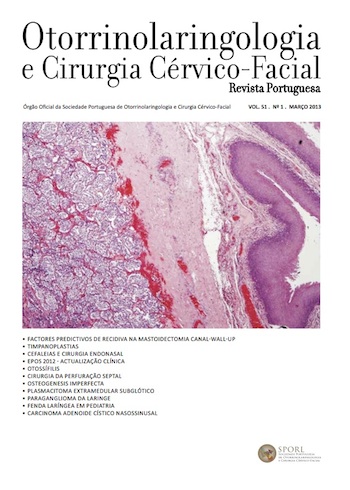Translation and cross-cultural adaptation of the “Vanderbilt Pediatric Dizziness Handicap Inventory for Patient Caregivers" questionnaire to Portugal for pediatric vertigo evaluation
DOI:
https://doi.org/10.34631/sporl.1028Keywords:
Child, Dizziness, Surveys and questionnaires, Focus groups, Caregivers, PortugalAbstract
Vestibular disorders in childhood may lead to avoidance behaviours, with associated adverse effects, and thus rapid diagnosis is important. This study aims to translate to European Portuguese and culturally adapt the "Vanderbilt Pediatric Dizziness Handicap Inventory for Patient caregivers" (DHI-PC) questionnaire to Portugal. The methodological sequence used was based on the steps recommended in the international literature. Three focus groups were conducted to evaluate the preservation of the construct and the correct understanding of sentences and expressions. The team responsible for the adaptation reached consensus taking into account the changes discussed in the focus groups, with the purpose of achieving semantic, idiomatic, experimental, and conceptual equivalence, which would ensure an accurate translation and an adequate cultural adaptation. For its use in clinical practice, validation of the instrument will be carried out in a second phase.
Downloads
References
McCaslin DL, Jacobson GP, Lambert W, English LN, Kemph AJ. The development of the vanderbilt pediatric dizziness handicap inventory for patient caregivers (DHI-PC). Int J Pediatr Otorhinolaryngol. 2015 Oct;79(10):1662-6. doi: 10.1016/j.ijporl.2015.07.017.
Jahn K, Langhagen T, Schroeder AS, Heinen F. Vertigo and Dizziness in Childhood − Update on Diagnosis and Treatment. Neuropediatrics. 2011 Aug;42(4):129-34. doi: 10.1055/s-0031-1283158.
Murdin L, Morrison GAJ. Balance disorders in children. In: Watkinson JC, Clarke R. editors Scott-Brown’s Otorhinolaryngology Head & Neck Surgery 8th Ed. Boca Raton: CRC Press; 2018. p. 219–30.
Pavlou M, Whitney S, Alkathiry AA, Huett M, Luxon LM, Raglan E. et al. The Pediatric Vestibular Symptom Questionnaire: A Validation Study. J Pediatr. 2016 Jan;168:171-177.e1. doi: 10.1016/j.jpeds.2015.09.075.
Dieterich M, Obermann M, Celebisoy N. Vestibular migraine: the most frequent entity of episodic vertigo. J Neurol. 2016 Apr;263 Suppl 1:S82-9. doi: 10.1007/s00415-015-7905-2.
Devaraja K. Vertigo in children; a narrative review of the various causes and their management. Int J Pediatr Otorhinolaryngol. 2018 Aug;111:32-38. doi: 10.1016/j.ijporl.2018.05.028.
van de Berg R, Widdershoven J, Bisdorff A, Evers S, Wiener-Vacher S, Cushing SL. et al. Vestibular migraine and recurrent vertigo of childhood: diagnostic criteria consensus document of the classification Committee of Vestibular Disorders of the Bárány Society and the International Headache Society. J Vestib Res. 2021;31(1):1-9. doi: 10.3233/VES-200003.
Bigelow RT, Semenov YR, Hoffman HJ, Agrawal Y. Association between vertigo, cognitive and psychiatric conditions in US children: 2012 National Health Interview Survey. Int J Pediatr Otorhinolaryngol. 2020 Mar;130:109802. doi: 10.1016/j.ijporl.2019.109802.
Beaton DE, Bombardier C, Guillemin F, Ferraz MB. Guidelines for the Process of Cross-Cultural Adaptation of Self-Report Measures. Spine (Phila Pa 1976). 2000 Dec 15;25(24):3186-91. doi: 10.1097/00007632-200012150-00014.
Verdecchia DH, Hernandez D, Andreu MF, Salzberg S. Translation and cross-cultural adaptation of the Visual Vertigo Analogue Scale for use in Argentina. Acta Otorrinolaringol Esp (Engl Ed). Sep-Oct 2020;71(5):289-295. doi: 10.1016/j.otorri.2019.10.003.
Jacobson GP, Newman CW. The Development of the Dizziness Handicap Inventory. Arch Otolaryngol Head Neck Surg. 1990 Apr;116(4):424-7. doi: 10.1001/archotol.1990.01870040046011.
Garcia FV, Luzio CS, Benzinho TA, Veiga VG. Validation and adaptation of dizziness handicap inventory to the portuguese language and population. ACTA ORLTécnicas em Otorrinolaringol. 2008;26(2):128–32.
Kim TH, Cha HE, Lee JG, Im GJ, Song JJ, Kim SH, et al. The Study of Standardization for a Korean Dizziness Handicap Inventory for Patient Caregivers. Korean J Otorhinolaryngol-Head Neck Surg. 2019 Aug; 62(8):442–7. doi:10.3342/kjorl-hns.2019.00416.
Downloads
Published
How to Cite
Issue
Section
License
Copyright (c) 2023 The authors retain copyright of this article.

This work is licensed under a Creative Commons Attribution-ShareAlike 4.0 International License.






